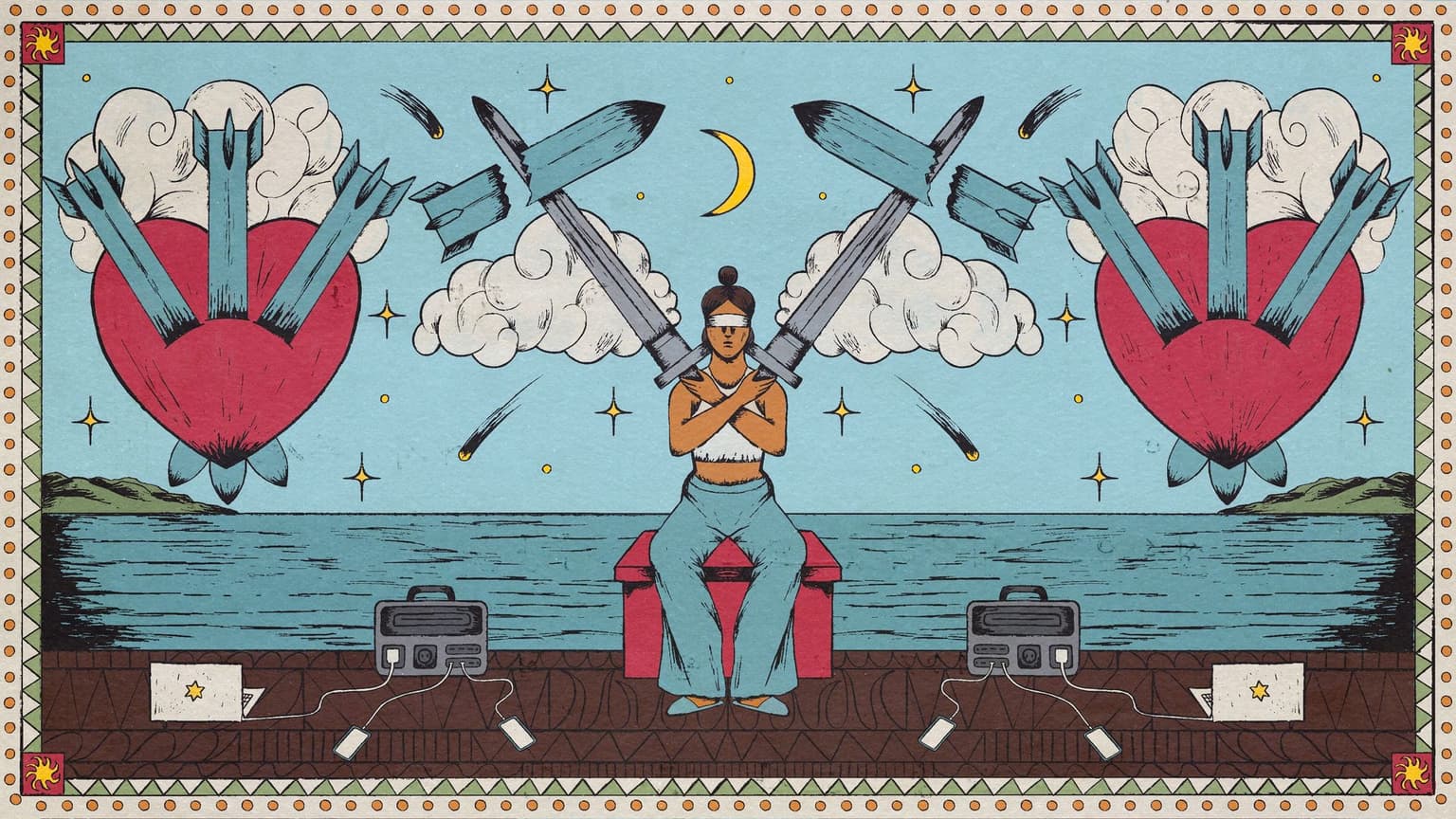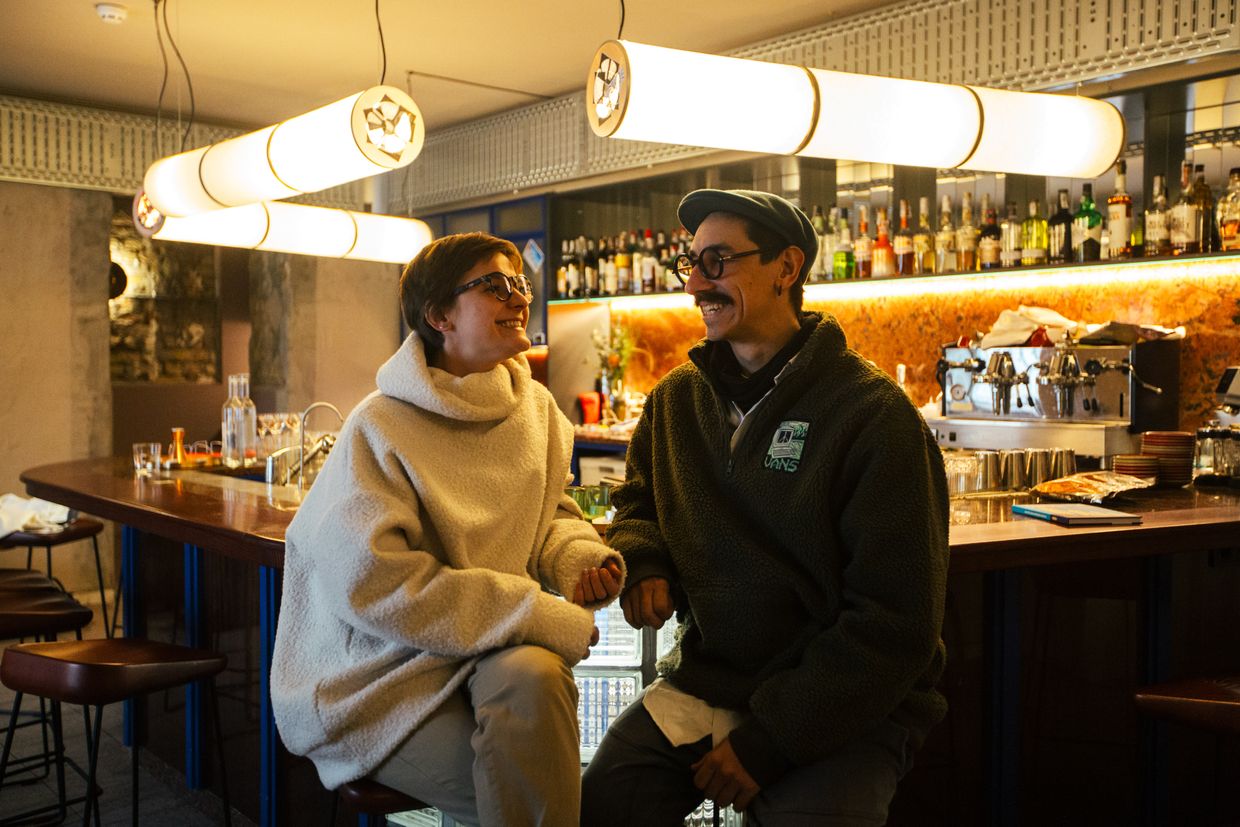When will Russia attack next? Some Ukrainians turn to tarot readers to find out

Amid the growing uncertainty of war, some Ukrainians look to tarot for answers. (Daria Filippova / The Kyiv Independent)
The viewer count ticks upward — dozens, then hundreds, sometimes nearly a thousand. Just about everyone has tuned in for the same reason: to hear Tetya (Auntie) Fania’s latest predictions about the threat of Russian attacks against Ukrainian cities.
“(Let’s look at) Kyiv in November,” she says during a recent broadcast, picking cards from a shuffled deck. “There could be problems with resources beyond electricity, gas, and the like. There will be serious water problems in Kyiv…Maybe rolling blackouts…”
In wartime Ukraine, one’s future can vanish in a heartbeat. That’s why some Ukrainians are turning to tarot — a deck of cards that symbolizes life’s themes, spiritual lessons, and everyday experiences, used for both divination and self-reflection — to try and gain some semblance of control amid chaos.
Around 43% of Ukrainians believe in various forms of the esoteric, which includes not only tarot but psychics and fortune tellers, according to a 2024 survey conducted by the Kyiv International Institute of Sociology (KIIS). Although interest spans both genders, women are more inclined toward such beliefs (49%) than men (36%).
The fascination with tarot isn’t unfolding just on online streams. Across Ukraine, practitioners are finding new audiences eager for insight. One of them is Gromovytsia (Thunderbolt) Berdnyk, a tarot card reader based in Kyiv.
“Tarot is a key to our subconscious — to that sacred space where the causes of events and phenomena originate. That’s the secret: through tarot cards, we can see how events may develop in a given situation,” Berdnyk told the Kyiv Independent.
“Our whole life is a road through the forest. Everyone encounters stumps, ravines, and sometimes wolf pits… and sometimes we can’t see the forest for the trees. Tarot can become that guide that leads us along the path and helps us navigate.”
Berdnyk describes her craft not as a hobby but as an “ancestral gift.” She says her great-grandmother was a fortune-teller and healer in her native village — for her, it’s a part of her lineage, passed down like an heirloom.
Like Berdnyk, Tetya Fania has also been practicing tarot since she was young. For her, tarot is “a tool for clairvoyance, a way to look into the future and foresee important things,” she told the Kyiv Independent.
Long before tarot decks had mainstream appeal, Ukrainian villages boasted of individuals believed to possess extraordinary gifts of spiritual healing and foresight. In the USSR, these esoteric practices were marginalized, but with the looming collapse of the Communist state, underground self-publishing networks — also known as “samizdat” — brought things like tarot into wider circulation across Ukraine and neighboring countries.
According to academic Ruslan Khalikov in his 2021 article on the topic, “there is evidence that in the late 1980s–early 1990s, esoteric books and journals arrived in Ukraine from the Baltic republics and Moldova” where these esoteric communities “did not experience the same level of (Soviet) repression as Kyiv.”
By the late 1980s and early 1990s, a wave of pop-culture mystics and esoteric figures also emerged across the post-Soviet space. In Ukraine, Vasilii Chumak gained widespread attention for performing “energy healing” on live television.
Though highly controversial, his prominence underscored the public’s enduring fascination with the mystical and a deep-seated desire for guidance amid social and political upheaval. A parallel phenomenon unfolded in Russia, where figures such as Anatoly Kashpirovsky captivated his audiences with mass televised hypnosis sessions.
Mental health experts say that seeking answers in the esoteric during uncertain times isn’t inherently wrong or harmful. In fact, there is value which comes from working one-on-one with a person who serves as a spiritual guide, helping one build trust in their own instincts.
“The idea of using tarot cards as a tool for self-reflection is, in itself, not a bad one and aligns with common psychological techniques,” Olga Grishun-Grischyk, a practicing psychologist in Chernivtsi, explained to the Kyiv Independent.
“However, like any tool, it can cause harm if misused. If we delve deeper, tarot cards are symbols, metaphors of sorts, so each person interprets them in their own way — most likely seeing what they want to see or even what they fear to admit to themselves.”
The cards can only reflect the situation as it currently stands.
Ukrainians consult tarot readers such as Berdnyk and Tetya Fania on a wide range of questions, but a significant proportion are motivated by questions arising from Russia’s full-scale war — from mothers who have fled abroad with their children to those who have survived Russian occupation.
“The second largest number of war-related questions I get are related to occupation,” Tetya Fania said. “People really want to return home.”
Amid the relentless grief and uncertainty of Russia’s full-scale war, however, there are questions seasoned tarot readers like Berdnyk and Tetya Fania approach with caution. From the fate of missing loved ones to the dangers faced remaining in front-line cities, these boundaries reflect both ethical responsibility and the understanding that tarot is primarily a tool for guidance and reflection.
In Tetya Fania’s live streams, whenever people ask whether they should flee a particular city, she is quick to remind them that it’s ultimately their decision.
“I can’t tell someone about something bad that might happen to them. That shouldn’t be done — it’s a form of programming. I always warn about potential dangers and ask people not to ignore their intuition,” she explained.
When it comes to the war’s most difficult issues, such as missing persons, Berdnyk also treads carefully.
“I don’t always take on such readings and first try to assess through the cards whether it’s worth delving into. I always clarify that this is the most delicate area of tarot… and, of course, I don’t charge for such readings,” she said.
Berdnyk says she outright declines questions on how to avoid mobilization. Her refusal is rooted in a patriotic stance, emphasizing that she believes everyone has a role to play in Ukraine’s defense against Russian aggression.
“I have many close friends who could have avoided the front — some due to health reasons, others due to having three or more children — but they are there because they felt they couldn’t face their children otherwise,” Berdnyk explained.
She also hesitates to address questions about when exactly the full-scale war will end, explaining that its resolution is influenced by too many unpredictable variables to make any reliable predictions.
“The reality lines that would show the end of the war haven’t formed yet. And what does ‘end of the war’ mean? Victory? Return of territories? A ceasefire? The cards can only reflect the situation as it currently stands.”
Note from the author:
Hi, this is Kate Tsurkan, thanks for reading this story. I have to admit that the storyteller in me is deeply fascinated by the esoteric and what draws people to it, and so I got really into learning more about how tools like tarot are used as a form of spiritual guidance and diviniation for some people during wartime.
There is way more to this story, but I hope this caught your interest. If you like reading about this sort of thing, please consider supporting The Kyiv Independent.











